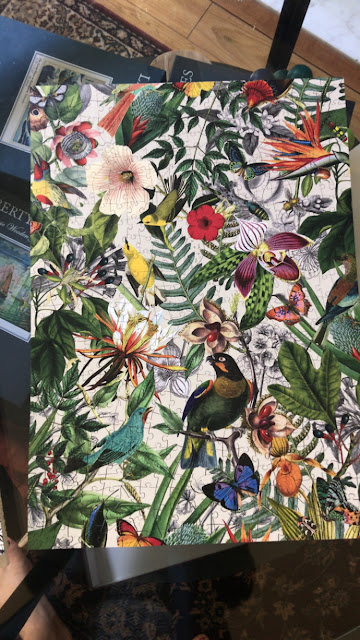Yeah.
While I have not invented anything as cool as calculus (yet) during this stay-at-home order, I have crushed a bunch of puzzles--jigsaw and crosswords.
This is a new one wooden jigsaw puzzle I bought for my birthday.
After finishing that one in a few days, I went to the hardest jigsaw puzzle I've ever done: The Apple Tree by Gustav Klimt.
On the surface, it doesn't look like it would be that hard, but when all of the pieces are dumped on the table, they all look to be the same color, more or less. I now no longer look at the the picture when I do a jigsaw puzzle (unless I get really desperate.) In this puzzle, it really doesn't matter because the picture doesn't help much. The first time I did this puzzle, it took me about three months. In COVID season, I've worked on it for about three days and I am about halfway done.
The New York Times has expanded their daily puzzle section in the print edition. The online version has more puzzles, as well. I've even taken to doing the Cryptogram:
Somewhere along the way, I picked up this book, which explained some of the strategies for solving Cryptograms. I think I bought this at Bletchley Park when Claire-Adele and I went to London in 2018. Or maybe I got it at the University Bookstore.
Heck, it isn't just jigsaw puzzles, cryptograms and crosswords that have kept me busy. I've scored 77 points on Google Doodle Cricket. My friend Anderson played cricket in his youth and his goal was to score 100 runs in a game. I am close. (The game crashed on my phone when I got to 77. I am probably the only person who played it that much ever.)
I was reading the newspaper today (against my better judgment and for the sake of my mental health) and I saw that tomorrow the New York Times is going to publish a Puzzle Mania section, "Emergency Edition" just for COVID season with a giant crossword puzzle.
I am convinced that during this pandemic someone will complete the last section of Kryptos, the sculpture outside of the CIA just out of the power of boredom.
Why puzzles? From the Puzzle Mania link:
“People feel stressed — we all feel stressed — and puzzles are a great way to relieve that,” said Will Shortz, the crossword editor at The Times since 1993. “They make you feel better. You feel in control of life when you’ve finished a good puzzle.”
Control. That is what we all have been missing. But how do puzzles give us control? We apply our brain power to it and it can be solved and completed with an answer or conclusion, unlike the situation with corona where there is no answer on how to cure it, prevent it, or stop it. How do we restart the economy? Can we ever see our friends or co-workers again? The puzzles give us a sense of accomplishment, of completing something, even though that sense is short lived.
Better yet, it gives us a way to pass time. Solving a puzzle is like being in hibernation. They allow us to quietly pass time alone without going nuts. I am starting to think of COVID season as a flight to Mars: slow, long, and alone. I don't what it is going to be like when I get there, and I don't know if I will ever return back to what I used to know as home.







No comments:
Post a Comment